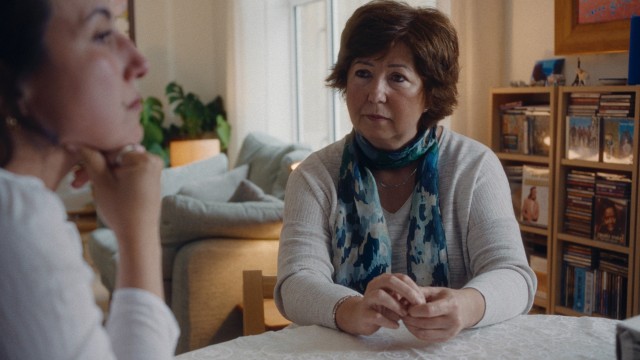Described as ‘an ode to music and memory’, Aleksandra Bilić’s 25-minute documentary The Score explores the things we leave behind when we’re forced to move on. An emotive watch, with a deeply personal angle for the filmmaker, the short transports its audience between Sarajevo and the UK, using archive footage/photography to invite viewers into the lives of the director and her mother, as she revisits the home she fled thirty-years-ago, during the Bosnian War.
Opening with some truly upsetting statistics about that conflict in the early ’90s, these are quickly contrasted with some heartwarming home-video footage of Bilić’s family. And family is key here, with The Score serving a dual purpose, as a tribute to the director’s mother and to Bosnian War refugees in Britain. Although it’s been almost 30-years since Bilić’s family was displaced, the pain of having to leave their home still feels so raw and through this personal story we learn more about, and empathise with, those who have experienced forced migration – something that is still happening all over the world.
Before leaving Sarajevo, Bilić’s mother, Maja, was a promising pianist with an exciting career in music ahead of her. While many of her peers have become famous musicians, something she is “really proud” of, although Maja went on to work as a music teacher, she hasn’t composed anything herself since leaving home. Returning to her flat, where her prized piano – which she describes as her “best friend” – waits, Maja composes one last piece and, along with her daughter, contemplates the past, present and future.

Aleksandra Bilić and her mother Maja on screen during the making of The Score
The Score is based around a simple premise and brought to screen through a straightforward documentary approach, but where it really stands out is through its emotive storyline. As we learn about the specifics of Maja’s story, and the Bosnian war in general, we’re touched by her loss and inspired by her positivity and you start to understand how important making this short is for both mother and daughter.
“Making the film helped enormously to validate the process we had to go through—that in the best years of my life, I had to leave, and I thought I would never go home”, Maja explains in this article that accompanied the release of the short on WePresent. Adding that she wanted “people to see how proud we are of what we had”, The Score really does feel like you are allowed access to this intimate moment between parent and child.
With her beloved instrument at first “completely unplayable”, when the piano tuner fixes it, he announces to Maja that she can now “play again for your soul”. It’s a fitting description as Bilić’s film is obviously a cathartic experience for the filmmaker and her mother, with the director revealing the project originated “from wanting to face up to a few things and do it together”. In the end, joining them on this journey is surprisingly uplifting and at The Score’s conclusion, as Maja plays her piano and the camera floats around Sarajevo, it feels as if a little of the burden from these experiences has been lifted and we’re all thankful for that.

 Rob Munday
Rob Munday